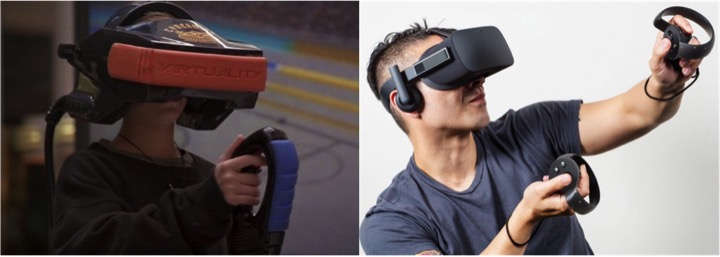I spend more time than is probably healthy thinking about video games.
In addition to spending pretty much all of my precious free time playing and what is left of my bank account buying games, I write and read a lot about everything video games so I can stay up to date on news games and advancements in the industry.
And lately, I’ll I’ve been hearing about is virtual reality.
Even my own mother – who has to leave the room when I play video games because she hates the thought of them corrupting her beautiful, innocent daughter – wants a VR headset so she can traverse the galaxy from the comfort of her own living room.
But this fanatical interest in VR isn’t anything new.
As Paul Younger from PC Invasion explains, there was a VR craze that lived and died in the 90s, partly because the systems were so expensive and partly because those systems ran on software that was woefully unprepared to deal with the demands of VR.
I mean it’s one thing to slide that ginormous headset over your face and expect to be transported directly into the world of your favorite video game. But it’s a totally separate thing to have your head weighed down by bulky hardware that acts as little more than a mini TV shoved up real close to your face.
Another reason the VR craze died in the 90s: pricing.
Most users assumed that as more and more people bought the fancy new systems, the prices would go down to a reasonable level.
But they never did.
Even now, these systems are worth anywhere from $400 to $800.
A quick Google search told me that the average price is around $500 with the famed Oculus Rift going for $600 and the HTC Vive around $800. The cheapest option is the PlayStation system at $400 and $500 (depending on the package purchased), but while PlayStation is a big name in gaming, they’re a little less known for their VR capabilities.
To be fair though, the only recognizable names in the VR market are really Oculus and Vive, but that’s not to say other companies aren’t trying to make a break for it.
On average, one VR system – which for some manufacturers includes the headset only – is worth 10 AAA console games.
While I’m not sure whether that speaks to the inflated price of video games or the ungodly amount of money users are expected to pay for VR, it does say a lot about why I’m so broke.
Money aside, the games available for VR aren’t the kind of games I’d regularly play, let alone ones I’d love to play on a specialized headset meant to drop me straight into the game.
Steam has a whole category of VR games – definitely more than I thought there would be – but many of them are previews and those that aren’t range from the hilariously stupid – Cockroach VR – to the interesting but ultimately pointless – Rail Adventures Tech Demo.
Maybe I’m being too harsh, but I just don’t understand the hype around VR.
My favorite games are those story-rich titles that keep me immersed and invested in the game without a fancy headpiece weighing my head down.
Call me old-fashioned, but I think I prefer a handheld controller to a motion detection system and a bulky headset that has the power to turn me into a gawking geek looking around wildly while all my friends watch me stare at nothing.
I’m not saying VR isn’t the future. In fact, I think in a couple years it will be exactly that. But first it needs to go through a long process of trial and error, of testing and refining. Some companies may argue that’s exactly what they’ve been doing since the 90s, but if this is what has come out of decades of research and testing then I think we still have a long way to go.
Because while the headsets may have gotten smaller and the computers slimmer and more sophisticated, there’s not a huge difference between headsets from the 90’s and what is on the market today.
In a couple years, I may eat my words about VR and gaming.
But until then, game on, my VR fanatics, and let the power of Lara Croft be with you.

Almost thirty years of research and development and it seems nothing has really changed in the overall design of the virtual reality headset.
Source: Gadgethelpline.com and Staticworld.net.
I’m the same way. I really don’t care for VR! I played a few VR games at E3 this year, and none of them seemed extremely great. I feel like VR game focus too much on gimmick and they lose quality in interactive storytelling. Great post!
I’m actually the Community Content Manager for NowLoading.co, and I would be thrilled if you considered posting on our platform (while still posting on your personal channels). If you don’t know much about us- we’re the same team behind Movie Pilot, and push to give awesome writers (like yourself) some exposure. Feel free to email me! My email and more info is on my about page. 🙂
LikeLike
Hey, I looked all over your about page, but I couldn’t seem to find your email. I’m really interested in writing about video games more because I love my blog but I could talk about video games forever honestly
LikeLike
Hey Lydia, Tyler is out of office at the moment, but I’d be more than willing to give you any information you may need. My contact is paul@nowloading.co 😀
LikeLike
Very interesting article! I also believe that VR has no future in gaming and I agree with your argument that nothing has changed in the past 30 years.
I write about science and technology on my website http://mindarticles.com. It would be really nice if you take a look at it. I would also like to hear your suggestions.
LikeLike